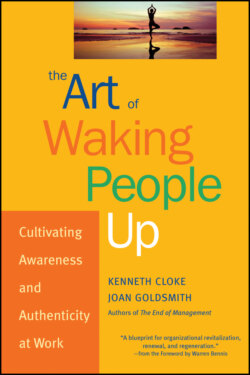Читать книгу The Art of Waking People Up - Kenneth Cloke - Страница 42
2
The Art of Waking Up
ОглавлениеWhen I think about it, I must say that my education has done me great harm in some respects. This reproach applies to a multitude of people—that is to say, my parents, several relatives, individuals, visitors to my house, various writers, a crowd of teachers—in short, this reproach twists through society like a dagger. . . . I can prove any time that my education tried to make another person out of me than the one I became.
Franz Kafka
Kafka’s reproach extends not only to relatives and teachers but to managers and supervisors who routinely try to make other people out of employees than the ones they are and mold them to fit preconceived notions of who they ought to be. When the mold reinforces the needs of the organization or management and ignores the needs of employees, it becomes oppressive to comply—and dangerous not to.
This managerial effort to mold employees to organizational ends can have positive or negative purposes. The purpose is positive when it shows employees how to succeed within a diverse organizational environment; when the employees’ own unique, creative natures are acknowledged and supported; when the organization and its leaders are open to being equally molded by those lower in the hierarchy; and when no one has to suppress who they are or what they think or feel out of fear or distrust.
On the other hand, the purpose turns negative when employees are required to conform to rules that restrict not only their behaviors but their cultures, identities, and characters; when they are required to surrender their dignity and freedom and then are treated as inferiors; when they are asked to deny who they are in order to uphold standards that are based not on shared values or human needs but on the desire of shareholders and officers to maximize their earnings through coercion and control; when rules and policies reflect only the wishes of upper management and not those in the lower ranks; and when upper management is allowed to behave differently as a result of its superior power or influence. The message sent to employees by these actions is that who they are is unacceptable and must be disguised or suppressed if they are to survive or succeed.
When directed to act in ways that suit organizational purposes but run counter to their own needs or desires, employees have four fundamental responses to choose from:
• Silent obedience and surrender of organizational responsibility, resulting in loss of energy, initiative, awareness, creativity, and active collaboration
• Passive-aggressive acquiescence, or “public compliance and private defiance,” resulting in hypocrisy, silence, deceit, subtle forms of sabotage, suppressed rage, cynical obedience, and a seemingly endless cycle of unresolved conflicts
• Active rebellion and refusal to comply, resulting in discipline or termination, adversarial communications, and a hardening of positions on both sides
• Strategic engagement and commitment to waking up, both within oneself and collaboratively with others, resulting in personal transformation, team commitment, and organizational learning
Among these choices, most employees opt for the first, slipping easily into a culturally acceptable semiconsciousness disguised as “meeting expectations.” Many select the second, becoming cynical, disaffected, and marginally recalcitrant. A few pick the third, revealing an underlying irreconcilability between themselves and the organization or its management. A small number choose the fourth, deciding to act strategically to alter the conditions under which they, their colleagues, the organization, and its leaders operate. In doing so, this fourth group takes on the more difficult task of reducing the role of hierarchy, bureaucracy, and autocracy while actively encouraging responsibility, risk taking, initiative, creativity, strategic thinking, honesty, leadership, and commitment—the very attributes organizations need in order to be successful in the long run.
Waking up does not mean lying to ourselves about how wonderful our work lives are, or giving up because we lack equivalent power, or retreating because the problems are too difficult or embedded to change. It means being honest and strategic at the same time, focusing on what can be changed, both in ourselves and in the organization, and committing to act with integrity and determination to expand everyone’s skills and capacity. Of all the options listed, the fourth is the most difficult to carry out in practice and the easiest to misunderstand, because it sends two contradictory messages at the same time: the rebellious separating message of opposition to negative conditions, and the obedient unifying message of commitment to personal and organizational improvement.
